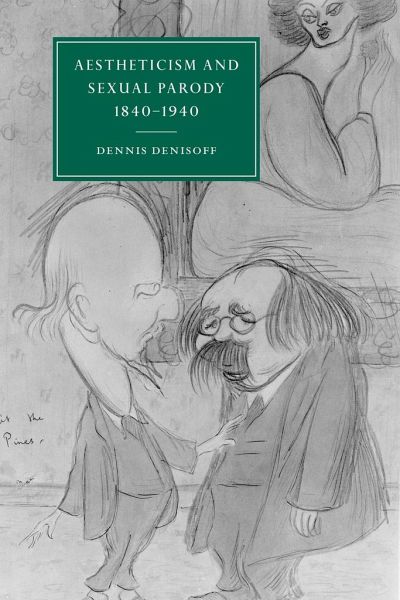
Aestheticism and Sexual Parody 1840 1940
Versandkostenfrei!
Versandfertig in 1-2 Wochen
51,99 €
inkl. MwSt.

PAYBACK Punkte
26 °P sammeln!
Studies the concept of parody as a strategy used by sexually marginalized groups.This original and provocative study discusses the work of a number of authors in the nineteenth and twentieth centuries, in order to argue that mainstream society was enabled to accept the non-normative sexuality of the Aesthetic Movement chiefly through parody and self-parody. Highlighting Victorian popular culture, Aestheticism and Sexual Parody adds a new and important dimension to the theorisations of parody as a combative strategy by which sexually marginalized groups undermine the status quo. From W. S. Gilb...
Studies the concept of parody as a strategy used by sexually marginalized groups.
This original and provocative study discusses the work of a number of authors in the nineteenth and twentieth centuries, in order to argue that mainstream society was enabled to accept the non-normative sexuality of the Aesthetic Movement chiefly through parody and self-parody. Highlighting Victorian popular culture, Aestheticism and Sexual Parody adds a new and important dimension to the theorisations of parody as a combative strategy by which sexually marginalized groups undermine the status quo. From W. S. Gilbert's drama and Vernon Lee and Christopher Isherwood's prose to George du Maurier's cartoons and Max Beerbohm's caricatures, Dennis Denisoff explores the parodies' interactions with the personae and texts of canonical authors such as Alfred Tennyson, Walter Pater, Algernon Swinburne, and Oscar Wilde. In doing so, he considers the impact that these interactions had on modern ideas of gender, sexuality, taste and politics.
Review quote:
"...it offer[s] an important interpretation of the data...This complex working of 'high' and 'low' cultures to widen social sympathies is an original contribution to our understanding of aesthetics."
English Literature in Transition
Table of contents:
Acknowledgments; Introduction; 1. Alfred Tennyson and the critical sexualization of Aestheticism; 2. The leering creatures of W. H. Mallock and Vernon Lee; 3. Gigolo economics: W. S. Gilbert and the market value of parodic promiscuity; 4. 'Men of my own sex': genius, sexuality, and George du Maurier's artists; 5. Epistemological misfiring in the aestheticist camp of Ada Leverson and Robert Hichens; 6. Max Beerbohm, Christopher Isherwood, and Camp Homage; Epilogue; Notes; Works cites; Index.
This original and provocative study discusses the work of a number of authors in the nineteenth and twentieth centuries, in order to argue that mainstream society was enabled to accept the non-normative sexuality of the Aesthetic Movement chiefly through parody and self-parody. Highlighting Victorian popular culture, Aestheticism and Sexual Parody adds a new and important dimension to the theorisations of parody as a combative strategy by which sexually marginalized groups undermine the status quo. From W. S. Gilbert's drama and Vernon Lee and Christopher Isherwood's prose to George du Maurier's cartoons and Max Beerbohm's caricatures, Dennis Denisoff explores the parodies' interactions with the personae and texts of canonical authors such as Alfred Tennyson, Walter Pater, Algernon Swinburne, and Oscar Wilde. In doing so, he considers the impact that these interactions had on modern ideas of gender, sexuality, taste and politics.
Review quote:
"...it offer[s] an important interpretation of the data...This complex working of 'high' and 'low' cultures to widen social sympathies is an original contribution to our understanding of aesthetics."
English Literature in Transition
Table of contents:
Acknowledgments; Introduction; 1. Alfred Tennyson and the critical sexualization of Aestheticism; 2. The leering creatures of W. H. Mallock and Vernon Lee; 3. Gigolo economics: W. S. Gilbert and the market value of parodic promiscuity; 4. 'Men of my own sex': genius, sexuality, and George du Maurier's artists; 5. Epistemological misfiring in the aestheticist camp of Ada Leverson and Robert Hichens; 6. Max Beerbohm, Christopher Isherwood, and Camp Homage; Epilogue; Notes; Works cites; Index.




